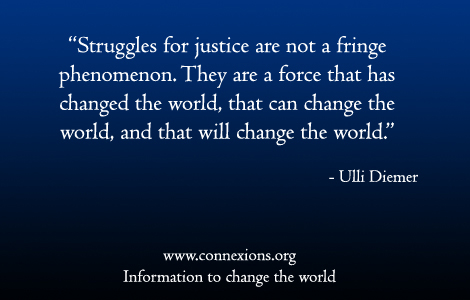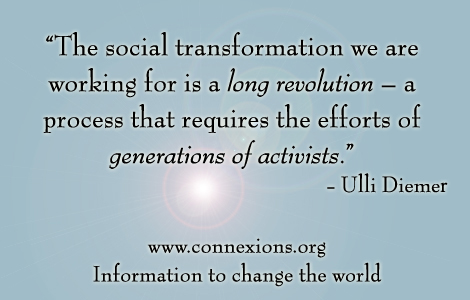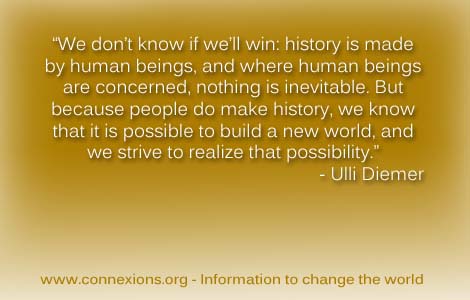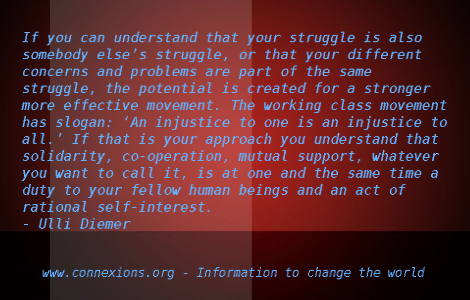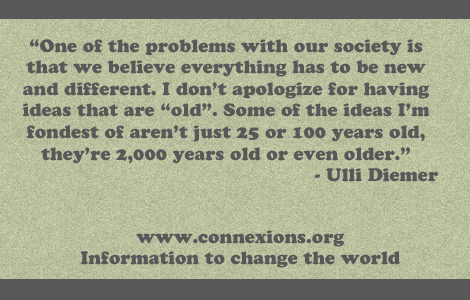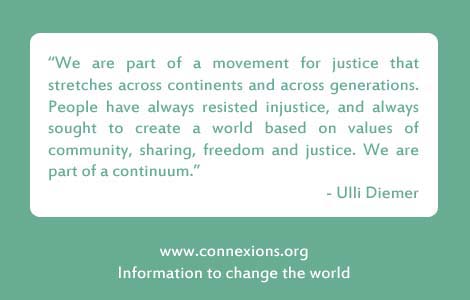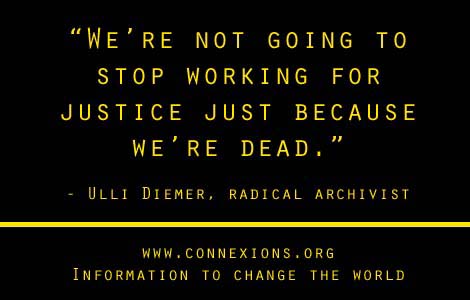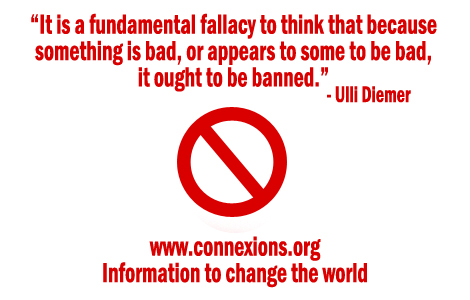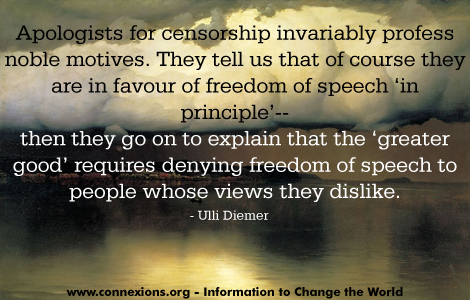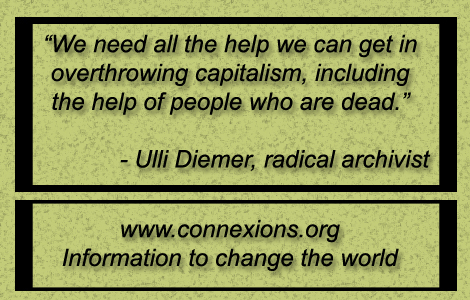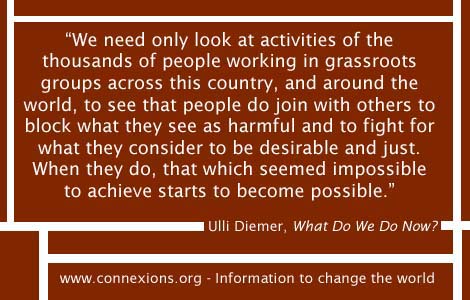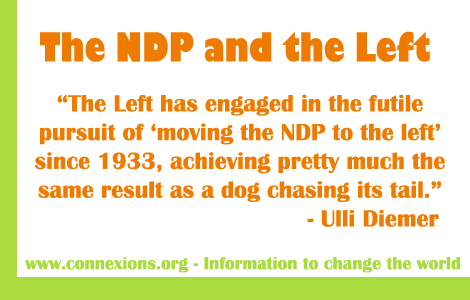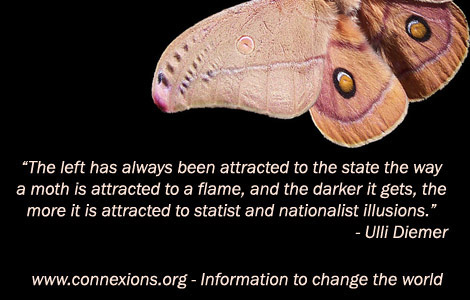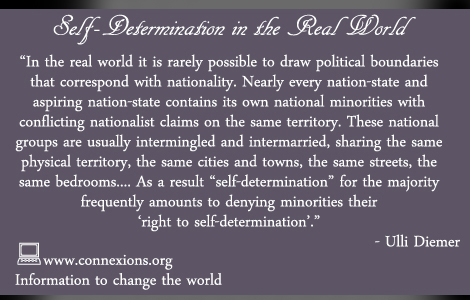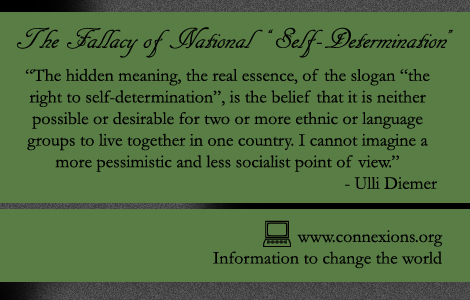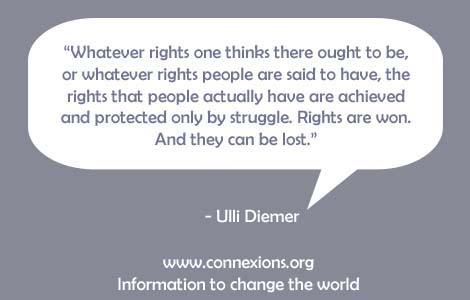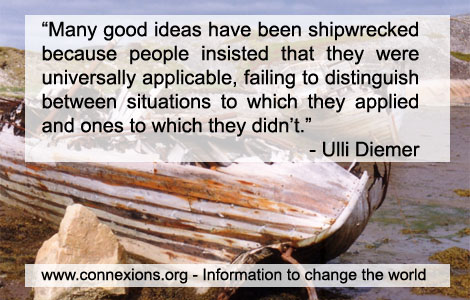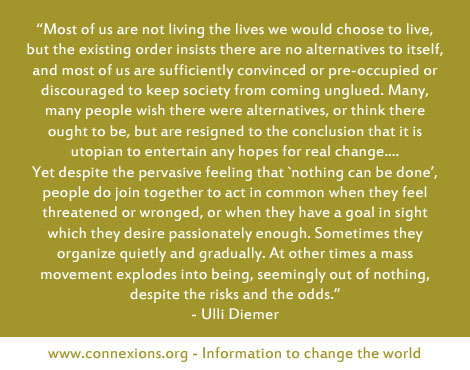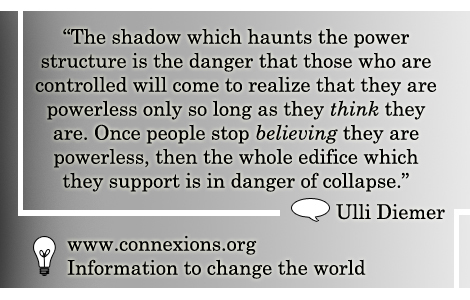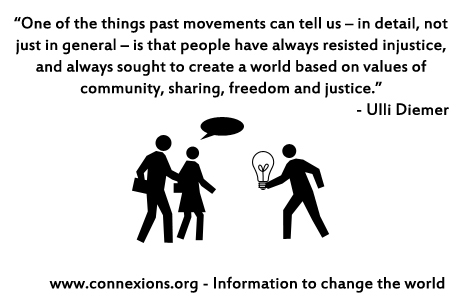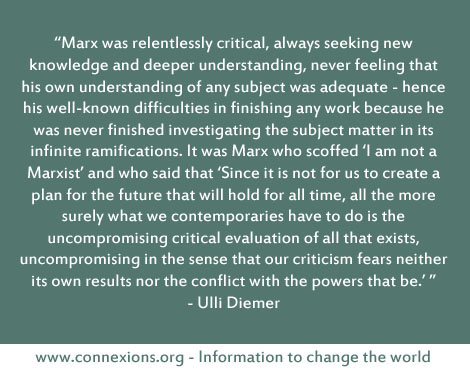
Ulli Diemer — Radical Digressions
Blogs & Notes
- Notebooks: 11 - 10 - 9 - 8 - 7 - 6 - 5 - 4 - 3 - 2 - 1
- Latest Post
- Moments
- Quotes & Fragments
- Scrapbook
- People
Articles Lists
- Selected Articles
- Articles in English
- Articles in French
- Articles in Spanish
- Articles in German
- Articles in Other Languages
- Articles A-Z
- Subject Index
- Moments (PDF)
- People
- Random Impressions
- Snippets PDF version

Compilations & Resources
- Connexions
- Other Voices newsletter
- Seeds of Fire
- Alternative Media List
- Manifestos & Visions
- Marxism page
- Socialism page
- Organizing Resources
- People’s History, Memory, Archives
- Connexions Quotations page
- Sources
- What I’ve been reading
- What I’ve been watching
Selected Topics
- Alternative Media
- Bullshit
- Censorship
- Chess
- Civil Liberties
- Collective Memory
- Community Organizing
- Consensus Decision-making
- Democratization
- Double Standards
- Drinking Water
- Free Speech
- Health Care
- History
- Identity Politics
- Interviews & Conversations
- Israel/Palestine
- Libertarian Socialism
- Marxism
- Men’s Issues
- Moments
- Nature
- Neo-Liberalism
- New Democratic Party (NDP)
- Obituaries & Tributes
- Political Humour/Satire
- Public Safety
- Self-Determination
- Socialism
- Revolution

Selected snippets & quotes from Radical Digressions
By Ulli Diemer
These bits and pieces are from articles by Ulli Diemer on the Radical Digressions website. They are intended as a starting point for exploring the content of the site. They are grouped under the topics listed below; some quotes may appear under more than one heading. Each item is followed by a link to the relevant article. There is also a PDF version.
• Alternative Media
• Alternatives
• Capitalism
• Chess
• Civil Liberties – Human Rights
• Class – Class Struggle – Solidarity
• Collective Memory – Archives
• Commons – Community
• Consensus – Decision-Making
• Democracy – Democratization
• Disobedience
• Environment
• Free Speech – Censorship
• Health – Health Care
• History
• Identity Politics
• Imperialism – Militarism – War
• Israel/Palestine
• The Left
• Liberals – Liberalism – Liberal Left
• Life
• Marxism & Revolution
• Media
• Men
• Nature
• Neoliberalism
• Police – Prisons
• Politics
• Public Interest – Public Safety – Public Services
• Reformism – Social Democracy
• Religion – Secularism
• The Right
• Science
• Self-Determination – Nationalism
• Sex – Relationships
• Socialism
• Spam – Artificial Intelligence
• Sports
• The State and Institutional Power
• Trotskyism
• PDF version of this page
Alternative Media
A radical newspaper has two primary tasks: to encourage critical thinking, and to encourage self-activity.
– Radical newspapers
Critical thought and self-activity cannot be encouraged by telling people what to think or what to do. It occurs only when people think for themselves and decide on their actions themselves. If a newspaper is to have a role, it must be a means of communication, organizing, and action for people, not the vehicle through which ‘radicals’ communicate their message to ‘the people’.
– Radical newspapers
I.F. Stone is serious, deeply serious, committed, and often appalled and angry at the truths he discovers. But he’s aware that a ponderous, moralizing tone wins few converts. Reading the articulate, urbane, and frequently witty Weekly was a reading pleasure, not a self-imposed penance dutifully performed.
– Twenty Years of I.F. Stone
Alternatives
“There is no alternative.” That is capitalism’s message in the neo-liberal era. The rich keep getting richer and richer, millions of people are unemployed, millions more are trying to survive on precarious, marginal, and part-time work, hundreds of millions are without health care, housing, education, or clean water. Environmental collapse is increasingly likely, masses of people are fleeing wars and economic disasters, nuclear war is a real danger. And all that the corporate elite, the corporate media, and the mainstream political parties have to offer is their insistence that there is nothing we can do about it: there is no alternative.
– Left parties
We need only look at activities of the thousands of people working in grassroots groups across this country, and around the world, to see that people do join with others to block what they see as harmful and to fight for what they consider to be desirable and just. When they do, that which seemed impossible to achieve starts to become possible.
– What Do We Do Now?
Most of us are not living the lives we would choose to live, but the existing order insists there are no alternatives to itself, and most of us are sufficiently convinced or pre-occupied or discouraged to keep society from coming unglued. Many, many people wish there were alternatives, or think there ought to be, but are resigned to the conclusion that it is utopian to entertain any hopes for real change.... Yet despite the pervasive feeling that ‘nothing can be done’, people do join together to act in common when they feel threatened or wronged, or when they have a goal in sight which they desire passionately enough. Sometimes they organize quietly and gradually. At other times a mass movement explodes into being, seemingly out of nothing, despite the risks and the odds.
– Introduction to The Connexions Annual
We don’t know if we’ll win: history is made by human beings, and where human beings are concerned, nothing is inevitable. But because people do make history, we know that it is possible to build a new world, and we strive to realize that possibility.
– What is Libertarian Socialism?
Utopian visions, be they practical or not, free our imaginations, if only for a little while, from the daily grind of struggle and worry, and allow us to dream about the kind of world we would hope to live in. Such dreams can inspire us and guide us, even if they are not always quite practical.
– Utopias
What we on the left can offer is a vision of alternatives. One of our tasks is to show that there are alternatives. We need to show that this is not the best of all possible world, that fundamental change is possible. One way of doing that is to keep alive memories of resistance and alternative visions. We have to fight the battle of memory: to remember that part of our history is shared values of community, sharing and solidarity.
– Oral presentation
There is another important lesson that this pandemic has taught us. After decades of austerity and cutbacks to health care, education, social services and environmental protection – basically everything except the military – it turns out that the money we need to do what is necessary is there after all. Cupboards that were said to be bare are suddenly found to have billions and billions of dollars in them, available to spend. This is a lesson we must remember.
– Thinking Clearly in a Time of Crisis
If millions of people can be paid to stay home, then it is certainly possible to shut down the most environmentally damaging parts of our economy and pay the laid-off workers to do socially useful work.
– Thinking Clearly in a Time of Crisis
Capitalism
From its beginnings, one of capitalism’s prime imperatives has been an all-out and never-ceasing assault on the Commons in all its manifestations. Common land, common water, public ownership – anything rooted in the ancient human traditions of sharing and cooperation is anathema to an economic system that seeks to turn everything that exists into private property that can be exploited for profit.
– The Commons
Marx’s analysis shows that the contradictions of capitalism cannot be resolved: capitalism is a system of continuous crisis, capable of destroying the planet on which it feeds in its endless need to extract more profit, more surplus value, and accumulate more capital.
– Seeds of Fire: Birth of Karl Marx, May 5, 1818
If Hitchcock had made a film about neoliberal economics, the Chicago School of Economics would be the Bates Motel, Milton Friedman would be the demented proprietor, and Friedrich Hayek would be the dead mother in the attic.
– Neoliberal house of horrors
The free market doesn’t ‘deliver the goods’ for most of the world’s people. It delivers a lot of goods for a few, a fairly decent standard of living for a larger number, and much, much less for the majority. The free market isn’t just the stockbrokers on Bay Street making several hundred thousand year, it’s also the cleaners in those same buildings making $7 an hour.
– Interview
The business of allowing polluters to buy their way out of complying with the law is an innovation with vast untapped potential. For example, law-abiding drivers could sell their unused speeding and dangerous driving credits to drivers who want to be able to hit the road without having to worry about speed limits or the niceties of the Highway Traffic Act.
– Polluted Logic
The ordinary citizens of Greece (and other countries) never saw the money loaned to “Greece” and derived no benefit from it. Yet they are expected to suffer the elimination of their jobs, wages, pensions, health and social services, etc., in order to repay the money looted by the oligarchs.
– Greece, Debt, and Crises
The essence of the capitalist economic system is the drive to accumulate as much as possible, by any means possible. It is almost inevitable, therefore, that those – individuals or corporations – whose existence revolves around accumulating capital will seek to avoid paying taxes.
The best way to avoid paying taxes, when you’re rich and powerful, is to shape and write the tax laws. And indeed tax laws are almost invariably written to favour those whose wealth derives from profits and investment, at the expense of those who work for a living.
– Tax Evasion
For all that the neo-con agenda is driven by ideology and class interests, isn’t there something about its leading proponents, its ideologues, that seems to transcend ideology, economics, even history? Isn’t there a essential quality to such people, a basic lack of empathy for their fellow human beings, that draws them to the camp of privilege throughout the centuries, always and forever praising the merits of the powerful?
– Abraham Lincoln saw it
The absurd claim that the IT industry flourished “because of a free-market environment” could not possibly be more wrong. The high-tech industries, in the U.S. in particular, owe their very existence to massive levels of government subsidies and intervention. The Internet, for example, was created and developed by the United States military in co-operation with government-funded universities. It was turned over to the “free market” only after more than 25 years of publicly-funded work had made it commercially viable. The electronics, semi-conductor, and computer industries, the communications industry, the aviation industry, the biotechnology sector – all the important high-tech sectors in the U.S. – have been developed through huge, and continuing, public subsidies backed by extremely aggressive protectionist legislation.
– The myth of a free market in publishing and high-tech
Free trade, which in fact has little to do with trade and much to do with re-shaping institutions to meet the demands of multi-national corporations, is part of a broader corporate agenda aimed at establishing an ‘unfettered capitalism’ and at eliminating or crippling anything that stands in the way. Social, environmental, and cultural programs are being attacked in the name of reducing government spending and staying competitive, and working people’s wages, working conditions, and unions are being hit through ‘privatization’, plant closures, demands for concessions, and other pressures.
– Economy, Poverty, Work overview for The Connexions Annual
The Trans-Pacific Partnership, negotiated in secret, and now scheduled to be rubber-stamped by national governments on a take-it-or-leave-it basis, is best understood as a major milestone in the long-term war waged by the corporate elite against any form of democracy. It gives corporations the power to block any environmental protections or health and safety legislation that could be interpreted as interfering with a corporation’s ‘right’ to make a profit by doing whatever it wants.
– Trade agreements and the corporate war on democracy
Even more ridiculous than the software industry’s grossly inflated numbers is their claim that the value of pirated software, whatever the true amount is, is money that is “lost” to “the economy”. The plain fact is that not one cent of it is “lost”. Instead of being spent on software, that money is simply spent on something else. That something else might be a competing product, or it might be rent, or books, or beer. But certainly it is spent on something, and it ends up circulating in the economy in just the same way as money spent on software does. It may be a loss to Bill Gates and his cohorts, but a loss to the economy it isn’t.
– The “cost” of software piracy
No doubt things look pretty rosy from the salad bars of the “upscale restaurants” in Bishkek, Kyrgyzstan, where foreign journalists like Geoffrey York rub shoulders with “swarms of Western advisers and consultants” (“Obscure little country becomes big success”).
Too bad it didn’t occur to Mr. York to find out how the people of Kyrgyzstan are faring under the marvellous “market reforms” which have turned the country into “the darling of the world’s economic reformers”.
– Things are good for everyone – except the vast majority
The calamities that are besetting our world have many faces: greed, short-sightedness, militarism, racism, sexism, endless growth – and they all have one name: Capitalism. The source of the problem, and the hope of a solution, lies with our own species: simultaneously the most intelligent, and the most stupid, of all the creatures living on this earth. – Longing for freedom, and grieving loss: Reflections on watching swifts on a summer evening
Chess
I learned to play chess as a child, in a time of great turbulence in my life. Chess offered a refuge, an ordered logical world of 64 squares. If you went wrong, you could see where and why, and you could learn not to make that mistake over again. And you could start over: once the game was finished, you could start a new one with a blank slate, without the baggage of the past. Chess offered something I could control when so much else was out of my control.
– Returning to Chess
Duchamp could also be taken as representing the archetype of chess player as addict, and indeed he once described himself as “a victim of chess.” In 1927, he married Lydie Sarazin-Lavassor – and then proceeded to spend their honeymoon visiting chess clubs during the day and solving chess puzzles during the evening.
Lydie had undoubtedly expected something more from the artist whose works included The Bride Stripped Bare by her Bachelors, Even, and Nude Descending a Staircase. One night, frustrated beyond measure, she descended the staircase herself and glued Marcel’s chess pieces to the chessboard. Had he been consistent, Marcel should have appreciated this as a brilliant piece of “ready-made” art. He didn’t. They were divorced shortly afterwards.
– Returning to Chess
Civil Liberties — Human Rights
We are often told that in order secure our rights, it is necessary to extend the powers of the state. In order to have the right to be safe from crime and terrorism, we are expected to give more power to the police and the state security agencies. So that we may have the right to enjoy essential services, the government has to have the right to ban strikes. To be protected from hate literature, we have to yield to the police and the courts the right to decide what we are allowed to publish or read.
– Human Rights/Civil Liberties overview for the Connexions Annual
A serious strategy for promoting right and liberties should challenge the right of the state to grant or withhold our rights and freedoms. Those who seek a freer or more just society subvert their own goals if they expect the government or the courts to achieve them on their behalf.
– Human Rights/Civil Liberties overview for the Connexions Annual
Whatever rights one thinks there ought to be, or whatever rights people are said to have, the rights that people actually have are achieved and protected only by struggle. Rights are won. And they can be lost.
– Rights and Liberties
Karl Marx observed that “No one opposes freedom – at most he opposes the freedom of others.” We guarantee our own freedom by supporting the rights and freedoms of others.
– Rights and Liberties
The more it is considered permissible to curtail freedom of speech, the more groups working for change become vulnerable to having their freedom of speech curtailed. This has been demonstrated regularly even in Canada, where laws originally targeted at Nazi hate literature have been used against groups protesting American domination of Canada, and where anti-pornography laws have been used against gay liberation publications, feminist videos, and sex education materials.
– Human Rights/Civil Liberties overview for the Connexions Annual
Who knew? The Nazi Holocaust, according to Public Safety Minister Steven Blaney, could have been prevented if only Germany hadn’t suffered from an excess of freedom of speech.
So much for the established historical view, according to which Germany was set on the road to totalitarian horror by a right-wing government which passed a series of emergency laws that abolished freedom of speech, outlawed all opposition, jailed critics, and set up a secret police apparatus to spy on the entire population, all in the name of “public safety.”
– The biggest threat to a free society is freedom of speech, says Canada’s Public Safety Minister
Class — Class Struggle — Solidarity
Marx believes that there exists a social majority – the working classes, the people who do the work of the society – who are capable of overthrowing capitalism and the capitalist state, and who in doing so can liberate themselves, and all of society. He believes that revolutionaries should engage themselves in the struggles that confront them where they live, but he is clear that finally a revolution that overthrows capitalism, a global system, must be an international revolution.
– Seeds of Fire: Birth of Karl Marx, May 5, 1818
Class conflict – first and foremost, the relationship between the capitalist class and the working class – is the fundamental contradiction that defines capitalist society.
– Race & Class
There is another, even more crucial reason, for putting the working class at the centre of a strategy for climate justice and economic transformation: the working class is the only social force with the potential power to bring about the radical changes we need to slow and stop accelerating climate change. A strategy that ignores the working class – the majority of the population – is a strategy for failure.
– Workers and Climate Change
If you can understand that your struggle is also somebody else’s struggle, or that your different concerns and problems are part of the same struggle, the potential is created for a stronger more effective movement. The working class movement has slogan: ‘An injustice to one is an injustice to all.’ If that is your approach you understand that solidarity, co-operation, mutual support, whatever you want to call it, is at one and the same time a duty to your fellow human beings and an act of rational self-interest.
– Interview
It is the structures of domination and power, that create racism, sexism, etc., in order to justify the existence of unequal wealth, power and the oppression that goes with them. Racism didn’t create slavery and the slave trade; racism was created to justify slavery. US/NATO aggression against the Middle East and the Islamic-majority countries aren’t a result of Islamophobia; Islamophobia was born out of the need to justify imperialist aggression.
– Supremacy, oppression, and power
Who does a worker have more in common with: an exploitative employer who belongs to the same ethnic group or religion, or other workers who come from totally different backgrounds but who face the same exploitation in the workplace?
– Inclusion or Exclusion
When have people with power ever yielded to anything except the opposing power of mass movements mobilized to challenge them in a direct and forceful way?
– Inclusion or Exclusion
In any strike in a public service, the public does tend to get very irritable, not because of the demands being made, but because of the inconvenience. So I would suggest that TTC [Toronto Transit] employees would do well to look at the example set in similar transit strikes in Britain and continental Europe. There, transit unions have adopted novel, and very successful, tactics. Rather than simply walk away from their buses, drivers have kept driving; but they haven’t let people pay their fares. The economic impact on management is exactly as severe as if vehicles weren’t moving, because no money is coming in. But there is no impact on the public, and the result has been that there has usually been great public support where normally there would be public pressure to end the strike.
– More than one way to strike
We know that our world is going in the wrong direction and that fundamental change is necessary. But we are confronted with entrenched structures of economic and political power. How can we challenge and overcome them?
Our own source of power is our latent ability to join together and work toward common goals, collectively. That requires organizing. Power gives way only when it is challenged by powerful movements for change, and movements grow out of organizing.
Organizing is qualitatively different from simple “activism”. Organizing means sustained long-term conscious effort to bring people together to work for common goals.
– Organizing
There can be no meaningful change without the active participation of the majority of the population: working people. Yet much activism ignores this obvious reality, while the organized labour union movement has put much of its reliance on ‘professionals’ who see organizing as a top-down technique rather than a grassroots movement.
– Organizing
Struggles for justice are not a fringe phenomenon. They are a force that has changed the world, that can change the world, and that will change the world.
– Struggles for justice
Collective Memory — Archives
To envision an alternative future, we have to understand our society as it is today. And to understand ourselves and our society, we have to know where we came from.
– Oral presentation
The past is part of the present. Choices made in the past brought us where we are today, and continue push us in particular directions. Knowing that those choices were the outcome of often-fierce conflicts between competing interests and alternative visions helps remind us that the future too is being shaped by similar conflicts and choices.
– Oral presentation
Our society disparages history, disparages elders and parents. If you look at advertising, parents and adults are almost always portrayed as ridiculous. The kind of advertising that makes you want to buy stuff: that’s mostly aimed at young people. If an adult appears they are typically portrayed as ridiculous and out of touch. That’s also part of the meta-message: “whatever anyone says to you from before ignore it because they don’t know anything: what matters is today’s products.”
– Collective memory, Archives, and the Connexions project
Those who live on conquered or stolen land rarely care to remember much about how the land came to be theirs. They prefer collective myth to collective memory. But they have to contend with the collective memories of those who were displaced. From Canada to Palestine, from South Sudan to Burma, people are working to document their stories and bring them to the attention of the world. In such instances, and others, the burning impulse is truth: to tell what happened to us.
– Collective Memory and Cultural Amnesia
A knowledge of history can be subversive. Remembering can be a form of resistance.
– Oral presentation
At the time of the European conquest of the Americas, the colonialists systematically destroyed the libraries and archives of Central America. They set out to destroy the very memory that something different had existed, that something different was possible.
The English acted with the same impulse when they set out to wipe out the language, and even the musical instruments, of the Welsh and the Irish.
– Oral presentation
There’s a myth that digitizing something preserves it safely and permanently, whereas paper will degrades and becomes unreadable. In reality, the opposite is true. Digital media become obsolete and unreadable in a remarkably short time. Paper lasts for centuries.
– Oral presentation
Every archive is a more-or-less random collection of fragments, reflective of the biases of those who collected the materials, as well of the vagaries of historical accident. Every archive is haunted by the ghosts of what is missing, what was not included, what was lost.
– Oral presentation
The social transformation we are working for is a long revolution – a process that requires the efforts of generations of activists.
– Oral presentation
We are a product of what has come before. That’s true generally, and specifically true in the context of working for alternatives and social change. The project we are involved in, trying to change the world, trying to get rid of an oppressive capitalist system and replace it with something based on the view of the Earth as a common treasury for everyone, that we need to take care of and not use as a commodity or property, and the view that we need to see each other as part of a common human family.
That’s a very long project. Capitalism has been around for 500 years and people have been struggling against capitalism for the same period of time. And before that people were struggling against injustice in the world, for as long as there has been injustice.
In many ways we’re part of a continuum. We are greatly influenced by things people have done before we were even born.
– Collective memory, Archives, and the Connexions project
We need all the help we can get in overthrowing capitalism, including the help of people who are dead.
– We need all the help we can get
History, including the histories found in archives, enables us to have conversations between generations.
– Oral presentation
The experience and knowledge of elders, and of people who have passed on, are threads of wisdom and experience that can be woven into the tapestries of our movements for change.
– Is that an archive in your basement...
or are you just hoarding?
Commons — Community
From its beginnings, one of capitalism’s prime imperatives has been an all-out and never-ceasing assault on the Commons in all its manifestations. Common land, common water, public ownership – anything rooted in the ancient human traditions of sharing and cooperation is anathema to an economic system that seeks to turn everything that exists into private property that can be exploited for profit.
– The Commons
We are seeing everywhere the signs of a social breakdown which can be linked to the breakdown of community and shared values. The dominant value system can increasingly be reduced to the idea that the only thing that matters is to get as much for yourself as possible. The real estate speculators and the street criminals both live by this motto, and both contribute their share to making cities less liveable. Governments at all levels make planning and transportation decisions which only worsen the problems.
– Community, Urban, Housing Overview for the Connexions Annual
The erosion of community has also eroded much of the basis for potential movements of opposition and change. Successful movements for change require that people know and trust each other, through working together, living in the same neighbourhood, or through voluntary association. Without the existence of natural communities, this becomes much more difficult. Indeed, those in positions of power have often consciously pursued a strategy of encouraging divisions along the lines of race, gender, language, ethnicity, and religion, precisely in order to prevent people from coming together in unions or in community groups to challenge their dominance.
– Community, Urban, Housing Overview for the Connexions Annual
Consensus — Decision-Making
Democratic groups are better equipped to deal with process problems. This is because democracy allows a group to proceed with what it wants to do in the face of people who are obstructive, obnoxious or insensitive. Democracy makes it possible for a group to say to such people, in essence, that ‘we don’t think this particular discussion or behaviour is constructive anymore, and we want to move on, whether you agree or not’. It enables the group to proceed in the way the majority of people in it want it to. Consensus, on the other hand, allows people who are insensitive or stubborn to bring the whole group grinding to a halt.
– One Vote for Democracy
What has actually happened in countless ‘consensus’ groups is that the group has been prevented from doing what most people in it wanted to do – in other words, prevented from functioning – because one or a few people have blocked consensus or dragged discussions on past the willingness of most members to continue participating in the group. The social change movement is littered with the corpses of groups which fell apart for precisely such reasons.
– One Vote for Democracy
What is really destructive of the integrity of the group is a situation where one person or a handful of people are able to block the desires of the overwhelming majority. When such a situation arises – and it does frequently in consensus-model groups – it makes a mockery of Alexandra’s assertion that “consensus... allows each person equal and complete power in the group“. On the contrary, in a situation where 100 people want to do something, and one person doesn’t and refuses consensus, consensus ultimately hands over all the power to one person, and totally disempowers everyone else.
– One Vote for Democracy
Democracy — Democratization
A constant theme in elite reaction to the Brexit referendum, expressed especially through the mainstream media, has been a visceral contempt for democracy. Ordinary working people are portrayed as stupid and reactionary, incapable of understanding how wonderful the European Union project is. Again and again, one hears the comment that the great unwashed should not be allowed to vote on issues which they are incapable of understanding. This reaction is not new: ruling classes for centuries have loathed democracy, which is seen as an existential threat to the wealth and privileges of the elite.
– Brexit, Jeremy Corbyn, and Contempt for Democracy
The attitudes of the elite have been mirrored on parts of the liberal left as well... neither of them is capable of seeing, let alone offering solutions for, the economic devastation caused by neoliberal institutions such as the EU and the various “free trade” agreements, and neither of them cares about the working class.
– Brexit, Jeremy Corbyn, and Contempt for Democracy
The Globe and Mail’s denunciation of the Day of Action protest as a violation of democracy makes perfect sense – as long as one understands the special way the Globe defines “democracy”.
“Democracy” according to this definition is a safe election every four years or so in which voters choose between corporate-dominated parties whose policies are virtually indistinguishable on all fundamental issues.
“Democratic government” in this context means rule by a political party, elected by a minority of the electorate, which in office breaks many of the major promises it made during the election campaign. The role of the vast majority of the population in this version of “democracy” is to remain passive and not interfere.
– The meaning of “democracy”
The trouble with democratic forms like voting and elections is that every so often, real democracy breaks out and propels parties and people to office who don’t play by the rules of the game. The most outrageous offence, from the perspective of imperial power, is pursuing policies that help ordinary people at the expense of transnational corporations and local elites.
– Destabilization and regime change
The issue of democracy, or the lack of it, connects, or has the potential to connect, many struggles and movements. The perspective of a radical democratization of society could contribute to linking the concerns and demands of these separate movements, and also has the potential to help move them forward. I think that as socialists we should make it a priority to try to put the issue of democracy – and of the meaning of democracy – on the agenda of movements for change, and on the agenda of society as a whole.
– Keep stressing democracy
Disobedience
Ultimately all power structures depend on the obedience of those over whom they rule. It helps if people believe in the legitimacy of those who wield power, but the crucial thing is obedience.
Once people start to disobey in significant numbers, the dynamic of power changes fundamentally. Disobedience, especially on a large scale, shakes the power of the rulers, and increases the power of those who disobey.
– Disobedience
When soldiers begin to question the orders they are given and start regarding the authority of those who give those orders as illegitimate, the military hierarchy, and ultimately the state itself, are threatened.
– Disobedience
In the unlikely event that I am ever called upon to share my wisdom as an elder, two of my teachings would certainly be “The media lie” and “The police are not your friends.” Rather than trust them, I prefer to see for myself.
– Freedom Convoy
Environment
Climate change is not a single problem: it is a product of an economic system whose driving force is the need to grow and accumulate. Nor does it affect everyone equally: those with wealth and power can buy themselves what they need to continue living comfortably for years to come – everything from air conditioning to food to police and soldiers to protect their secure bubbles – while those who are poor and powerless find their lives increasingly impossible.
– Climate change and social change
There is another, even more crucial reason, for putting the working class at the centre of a strategy for climate justice and economic transformation: the working class is the only social force with the potential power to bring about the radical changes we need to slow and stop accelerating climate change. A strategy that ignores the working class – the majority of the population – is a strategy for failure.
– Workers and Climate Change
Being able to make choices about what kind of risk to accept is itself a luxury and a privilege. The most dangerous situations are those that present a risk that can’t be avoided. If your skin is dark, going to the corner store is inherently a riskier activity than it is for someone whose skin is light, and if a cop arrives on the scene, you may be in real danger. If you work in a factory where you are breathing toxic chemicals every day, you may be aware of the risk (though very likely the company is lying about it), but you also know that if you don’t go to work, you won’t be able to pay the rent and feed your kids, so accepting the risk is not much of a choice. If you’re in a First Nations community and dangerous industries open up nearby, on land that used to belong to your people, you have no choice about what is happening to the air you breathe, the water you drink, and the fish you eat. The risks can be severe, but the choices are crummy.
– Some musings about risk
This is a government which prides itself on “making unpopular decisions,” on never compromising, on never changing course. The man in charge... is as determined as the captain of the Titanic, disdainfully brushing off ridiculous warnings of icebergs and giving orders to push on, full steam ahead.
– Contamination: The Poisonous Legacy of Ontario’s Environmental Cutbacks
Gentlemen from this chemical company – and many others – are quite literally pouring these and many other poisons into your coffee and your kids’ juice. They just do it in a more indirect, anonymous, and apparently socially acceptable way.
– 150 Years of Dirty Water
The number of pedestrians that get killed by cars every year... is where offsetting could really make a difference. Suppose we pay some other municipalities, like maybe Tobermory or White River or New Liskeard, to not kill any pedestrians? If we paid 20 towns to not kill five pedestrians each, we could kill 100 pedestrians in Toronto every year, and still achieve our ‘Vision Zero’ goal.
– Adding up to zero
Free Speech — Censorship
Believe it or not, some of us would rather not have customs officials and police deciding what we can read or look at. We’d rather decide for ourselves.
– Against Censorship
What is perverse is the assumption that the cure for our free speech deficit is to have even more limitations on freedom of speech. The corporate media suppress views they don’t like? Then let’s get the state into the censorship business too! The more censors, the better!
– Free speech for me – you shut up
Apologists for censorship invariably profess noble motives. They tell us that of course they are in favour of freedom of speech ‘in principle’ – then they go on to explain that ‘the greater good’ requires denying freedom of speech to people whose views they dislike.
– Free speech for me – you shut up
This is the classic position of wannabe totalitarians everywhere, including the ‘progressive’ ones: people can’t be trusted to think ‘correctly’, so we, the superior ones, the ones who always know best, have to suppress anything that we consider to be offensive or dangerous.
– ‘Free speech’ – as long as it doesn’t offend anyone
The fundamental fallacy of which people like her are guilty is the belief that because something is bad, or appears to some to be bad, it ought to be banned.
– Opposing Censorship
Future historians will be amazed to learn how much energy was devoted to attempting to regulate what images and fantasies men should be permitted to contemplate while they masturbate.
– ‘Free speech’ – as long as it doesn’t offend anyone
How can you defend ‘choice’ by denying people the right to choose what opinions and debates they will listen to? What could be more insulting, and more anti-woman, than the attitude that women have to be protected from being exposed pro-life propaganda because they aren’t smart enough or strong enough to think it through and reject it on their own?
– ‘Free speech’ – as long as it doesn’t offend anyone
Laws against hate speech usually serve only to catch (and provide free publicity to) marginal cranks: the smart hatemongers know how to code their message in ways that don’t cross the line while still making the intent clear.
– ‘Free speech’ – as long as it doesn’t offend anyone
I think the answer to hate speech has to be political, i.e. exposing it, refuting it, and organizing politically against the hatemongers. The state is far too blunt and dangerous an instrument to be used to legislate our individual and collective responsibility to treat others with respect and decency. We can’t let hate speech serve as an excuse to expand the repressive powers of the state.
– ‘Free speech’ – as long as it doesn’t offend anyone
‘Progressive’ apologists for censorship like to make the point that some people – the owners of the corporate media and the commentators they employ, for example – are more able to make their views heard than ordinary citizens, and that therefore our ability to exercise our right to free speech is limited in any case. That’s true enough. But how on earth does that lead to the conclusion that we should therefore invite the state to impose even more limits on what we can say or write? Wasn’t there a time when progressives saw their role as mobilizing people to fight for their rights, rather than pleading with the state to censor us?
– ‘Free speech’ – as long as it doesn’t offend anyone
One of the consequences of the idea that it is wrong to give offense to any group is to strengthen the most reactionary conservative elements in those communities at the expense of the more progressive currents, since the reactionaries are always the ones who can be depended on to be offended by any criticism, including criticism from dissenters within their communities.
– ‘Free speech’ – as long as it doesn’t offend anyone
Whereas those who considered themselves liberal or left used to share John Milton’s opinion that the surest guarantee of the truth of our views is to expose them to criticism, now the shared attitude of both the neo-liberal opinion managers and the neo-liberal left (which is to say, most of the left these days) is that dissenting opinions should be suppressed.
– Watching the News
Health — Health Care
There isn’t much mystery about the agenda that drives the media’s attack on medicare. It’s the same fundamentalist-capitalist dogma that dominates most political discourse. That dogma holds that everything in all areas of human existence should be owned and controlled by private corporations whose purpose is to maximize profits. Everything is a commodity to be bought and sold in the private marketplace. Any service that is provided on the basis of human need rather than profit is an outrage that cannot be allowed to stand.
– Medicare Myths and Realities
This particular horror story – Kay calls it his “run-in with the system” – begins when he shows up at his local hospital’s emergency room with an infected knee. The trouble is with his left knee, he tells us – reinforcing his belief, no doubt, that anything on the left is unreliable and troublesome. The inefficient socialistic health care system sends him off for treatment within ten minutes – not too shabby, most of us might say – but it takes a lot more than efficiency and high-quality appropriate care to please a National Post columnist. Soon he is lying in a public hospital bed, intravenous clindamycin trickling through his veins, and thoughts about how much nicer a private hospital bed would be flooding through his brain.
– National Post columnist traumatized by having to wait his turn
Logically, it is absurd to suggest that if we can’t afford something because it is too expensive, the solution is to make it even more expensive. User fees don’t reduce costs, they increase them, not least by requiring the creation of a billing bureaucracy to administer them. What user fees really do is create a two-tier system.
– Medicare Myths and Realities
The real advantage of user fees, from the point of view of those who advocate them, is that they deter the poor from seeking medical care. If the poor can be denied medical care, then those who are not poor can avoid helping to pay for their care.
– Ten Health Care Myths
The evidence from all OECD countries shows that the private sector is far more bureaucratic and much less efficient than the public sector when it comes to providing health care.
– Ten Health Care Myths
But here’s a shocking piece of news for Mr. Kay: most Canadians feel that immigrants like my mother and me, and seniors, and the poor, are just as deserving of prompt dignified health care as are those who, like him, are more well-off. We’re appalled at the idea that access to care should be prioritized not on the basis of need, but on the basis of who walks into the hospital with the biggest wad of cash.
– National Post columnist traumatized by having to wait his turn
How does one go about ‘abusing’ the system? Patients don’t write their own prescriptions, book their own tests, or perform surgery on themselves: doctors do that. Are there many people who deliberately seek out unnecessary treatments because they enjoy frequent colonoscopies or because their idea of fun is spending a couple of hours sitting in a waiting room?
Did a worried parent who took a sick child to the emergency room ‘abuse’ the system if it turns out the child wasn’t seriously ill? Is a hospital being ‘abused’ if it treats a temporary foreign worker who is sick but doesn’t have a health card?
– Medicare Myths and Realities
No doubt there are a few addicts out there who fake symptoms to get their hands on painkillers. That’s not a good thing, but they probably cost the public purse less than half a dozen CEOs getting together over an expensed lunch to swap tips about tax evasion.
– Medicare Myths and Realities
Now personally, I find that my ‘yuck reaction’ is triggered when I picture almost any medical-surgical procedure, be it brain surgery, an eye operation, or amputating a gangrenous toe. I interpret this not as a message from my deepest moral instincts, but as evidence of my personal squeamishness about blood and sharp objects. I wouldn’t consider my reaction to the ’yuckiness‘ of a medically appropriate procedure as an argument for banning it.
– Margaret Somerville’s yucky logic on abortion
Myth #9: Your health is your responsibility.
Reality: Of course it is. Here are some handy tips: Eat lots of vegetables and fruit. Exercise. Don’t smoke. Don’t eat too many fatty salty foods.
Oh, yes: while you’re at it: make sure you don’t choose parents who are poor or unemployed or poorly housed. Avoid being born with dark skin or in a Native community. Steer clear of planets where carcinogenic chemicals saturate your workplace, your food, your water, and the air you breathe.
– Medicare Myths and Realities
In countries infected by the plague of neo-liberal austerity, including Canada, health care, including public health preparedness, has been gravely compromised by years of cutbacks and short-sighted decision-making.
– Thinking Clearly in a Time of Crisis
Few things are more wrong-headed than advising people with cancer (or any illness) to maintain a ‘positive attitude.’ That is about as helpful as telling someone suffering from depression, or grieving the death of a loved one, to ‘cheer up.’
– Thinking about Terry Fox and the Marathon of Hope
History
Historical memory is potentially subversive because it tells us that no form of society is permanent, and no economic system is inevitable. By reminding us that there are alternatives, it reminds us that we can choose our future.
– Oral presentation
All archives are accidental, and every archive is haunted by the ghosts of what has been lost.
– Oral presentation
We are part of a movement for justice that stretches across continents and across generations. People have always resisted injustice, and always sought to create a world based on values of community, sharing, freedom and justice. We are part of a continuum.
– We are part of a continuum
The hard-won experiences of the past, the disasters that our ancestors learned from at great cost, are disappearing down the memory hole.
– Abandoning the Public Interest
If we think back a few years, before Gorbachev, then we remember an Eastern Europe which appeared to be, from the inside as well as the outside, an immovable monolith. The system of social control, while in some ways crude by Western standards, was total and relentless, and few saw any hope of ever achieving change. Only a tiny minority opposed the regimes, and they suffered for it. Yet almost overnight, those who but a historical moment earlier had no hope or thought of resistance or rebellion suddenly came together in their tens and then hundreds of thousands, and the powerlessness, passivity, and resignation of the people turned almost instantly into their opposites. The truly remarkable victories they have achieved should inspire us in our own efforts in working for change in the West and remind us that fundamental change is possible even against formidable odds.
– Looking for Democracy
My emerging political awareness also included a sense of history: my grandfather had participated in a failed revolutionary uprising in Germany in 1919 and had gone to prison for his political actions in the 1930s. I came to believe in the need for and the possibility of revolutionary change, but I also had a sense that things could go very badly wrong. I’ve always found it valuable to look at what previous generations of activists and said and done, what debates they had, what they’d done right and what they’d done wrong.
– Oral presentation
Identity Politics
The concept of a society consisting of “communities” identified by their ethnicity, language, or religion is the very antithesis of real empowerment. It is a model that presupposes that “making a difference” is about nothing more than lobbying for more services for your own ethnic group. When you think about it, that is really a narrow, conservative, and even demeaning vision of what it means to be a citizen.
– Inclusion or Exclusion
As an atheist and a secularist, I am disturbed when I hear people suggesting that in a secular society like Canada, it is desirable for political activity to be centered around churches, mosques, and temples.
– Inclusion or Exclusion
Leaders who advocate a vision of distinct “communities” that speak different languages, keep apart from each other, and communicate with the structures of the larger society only through interpreters, are doing more harm than good. What they are advocating is not diversity but entrenched division.
– Inclusion or Exclusion
Real change, real empowerment, can only happen when people work together on the basis of common goals regardless of their ethnic or religious background.
– Inclusion or Exclusion
Simplistic theories which relate violence to one factor and one factor only – maleness – actually serve to discourage a serious examination of what it is that leads some men and also some women to become violent. Instead of thinking seriously about causes and solutions, we assume we already have the key: the problem is maleness. This reductionism view (people with penises are prone to violence, people without penises aren’t) is as wrong as ideologies which claim that propensity to crime is somehow linked to skin colour.
– Dances with Guilt: Looking at Men Looking at Violence
Progress in diversity isn’t limited to the media. For example, in the bad old days in Afghanistan, when a drone hovered overhead and then dropped a bomb on your wedding party, it was overwhelmingly likely that it was a white man dropping that bomb on you. Now, it could well be that the bomb that kills your family is being sent by a woman, or a person of colour. If that isn’t progress, what is?
– Watching the News
Imperialism — Militarism — War
Capitalism hates competition, and the U.S., the world’s dominant capitalist power, has never tolerated competitors, rivals, or leaders who dare to put their own country ahead of U.S. interests.
– Lurching to War
One of the driving forces underlying U.S. aggression and militarism has always been the military-industrial complex, arguably the most important sector of the U.S. economy. There are enormous profits to be made in supplying weapons and military systems, and therefore in inventing threats and stoking conflicts. The economies of many of the NATO states are highly integrated into this militarized economic system, making their elites willing accomplices in U.S. militarism.
– Lurching to War
A rogue state, heavily armed with weapons of mass destruction, openly contemptuous of international law and the United Nations, and with a lengthy record of threatening and invading other countries, has plunged the world into crisis. How should the world respond to this threat? What can we do about the United States and its undisguised imperial ambitions?
– The Iraq crisis in context
American soldiers, many of whom – like their Egyptian, British, French, and Canadian counterparts – joined the armed forces to escape poverty and unemployment, will also shed their blood in a needless war. The injured and shell-shocked survivors will return to the same neglect and ingratitude that greeted the American Vietnam veterans now living in poverty and pain, and the crippled Iraqi veterans who beg in the markets of Baghdad.
– War in the Gulf
The people of all countries, whether Russian, American, Chinese, Canadian, etc., are much the same mixture of good, bad, and indifferent that we find in our own society and in ourselves. And most people everywhere want much the same things: a decent life, a better life for their children, security, and to live in peace. The Russian people no more want to be annihilated in a war than we do. They are not our enemies.
– The Bomb Won’t Go Away on its Own
The people who can’t manage to bring their own astronauts back alive assure us that they can keep nuclear weapons safely orbiting above our heads with no chance of anything going wrong.
– The Iraq crisis in context
We see the U.S. and its allies launching themselves into an unnecessary but potentially calamitous war, all the while believing they remain in control of events and that everything will turn out just as they planned. Those who will pay the cost will be those who had nothing to do with starting the war. Ordinary Iraqi working people, who have already suffered for years under an exceptionally brutal dictatorship, will face death and maiming, the loss of loved ones and of homes and possessions.
– War in the Gulf
The U.S. government and the house-trained media which spread its message would have us believe that Venezuela, a country which regularly holds internationally monitored, closely contested, elections, is a dictatorship which needs to be overthrown, while countries like Egypt, Israel, the Philippines, and Saudia Arabia, whose jails are overflowing with political prisoners, are stalwarts of the free world.
– Official Enemies
Progress in diversity isn’t limited to the media. For example, in the bad old days in Afghanistan, when a drone hovered overhead and then dropped a bomb on your wedding party, it was overwhelmingly likely that it was a white man dropping that bomb on you. Now, it could well be that the bomb that kills your family is being sent by a woman, or a person of colour. If that isn’t progress, what is? But I digress.
– Watching the News
All-too-many liberals and activists followed in the footsteps of the socialists who had betrayed their principles in 1914, and cheered on the bombing of Serbia and Libya. Repeating slogans about “duty to protect” and “humanitarian intervention,” people who had once identified with the left were now cheering on NATO’s humanitarian bombing of civilian populations.
– The main enemy is at home
Our duty, I suggest, is to heed Karl Liebknecht’s call: “The main enemy is at home.” That enemy – U.S. imperialism, NATO, Canada’s complicity, and the military-industrial complex – is the enemy we must fight. It’s a hard thing to do, and it takes some courage, perhaps, but it’s something that could perhaps make a difference in the long run.
– The main enemy is at home
Something that particularly disturbs me is the loose talk among pro-NATO cheerleaders about how ‘we’ should support Ukraine militarily. Who are ‘we,’ exactly? It is my impression that many of the people posting these comments are pensioners sitting in front of their computers thousands of miles away from the fighting, people who are extremely unlikely to join the Ukrainian army.
So then, who does ‘we’ really refer to? It refers to NATO, which is a tool of U.S. imperialism, and the source of limitless profits for the arms industry. It is a sad fact is that people who used to oppose NATO (at least until Yugoslavia/Kosovo in the late 1990s or Libya in 2011, when quite a few former leftists became supporters of imperialist interventions) are now full-on supporters of NATO. When they say ‘we’ they mean NATO, and the military-industrial complex in NATO countries.
What is also astonishing is that the people who take this position can support all-out NATO involvement in this war while simultaneously denying that this is a proxy war being waged by NATO.
– Our job is to oppose the U.S.-NATO Empire
Israel — Palestine
If working-class Israeli Jews were to see their interests as being different from those of the ruling elite – if they come round to the view that their long-term interests will be better served if they join Palestinians in working for a democratic secular state with equal rights for Palestinians and Jews – Israel’s ruling class would find itself in the same untenable position that the white elite in apartheid South Africa faced in the early 1990s.
– Tactics of desperation: Using false accusations of ‘anti-Semitism’ as a weapon to silence criticism of Israel’s behaviour
An Associated Press (AP) story, carried by many corporate media outlets, reports that former Israeli Prime Minister Benjamin Netanyahu is seeking to negotiate a plea deal in his bribery trial. The goal is to avoid an “embarrassing and protracted trial,” says AP, that “risks tarnishing his legacy.” Isn’t that rather like worrying that a shoplifting conviction could “tarnish” Jack the Ripper’s legacy?
– Netanyahu’s Legacy
The extreme and widespread racist prejudice against Palestinians is at the root of much of the indifference or hostility that Palestinians and their allies have to fight against in their efforts to win sympathy and support for their cause. People who claim to have the highest moral principles immediately forget those moral principles when Palestinians are involved.
– Massacres and Morality
The Left
Many on the left practise their own version of political disengagement. With the best of intentions but questionable priorities, they reach out to the already converted to organize actions which bring together the same small groups of people to proclaim their principled dissent from the status quo. What is all too commonly missing is any attempt to reach out to the vast majority of the population, those who won’t come to, or ever even hear about, the protests of the left.
– Hearts and Minds: How Do People Change?
The fuzzy, jargon-ridden language of leftist writing is perhaps the most immediately noticeable thing about the left to the ordinary person, and it is one of the main reasons that most of what the left has to say is not even listened to.
– Words, words, words
The energies of much of the left are devoted to issuing appeals to the capitalist state to fix our problems, or to looking for ways to fix the state as if it had somehow accidentally gone off track. The left has always been attracted to the state the way a moth is attracted to a flame, and the darker it gets, the more it is attracted to statist and nationalist illusions.
– Thinking About Self-Determination
The left will continue wallowing in this morass as long it is encumbered by its uncritical acceptance of the slogan “the right to self-determination”. The hidden meaning, the real essence, of this slogan, is the belief that it is neither possible or desirable for two or more ethnic or language groups to live together in one country. I cannot imagine a more pessimistic and less socialist point of view.
– Thinking About Self-Determination
It is surely a sad commentary on the political creativity of many of those who aim to create a whole new world that they are normally able to conceive of only one single political tactic, a tactic which is supposed to fit all situations: the demonstration. No matter what the issue, the knee-jerk response of the left is nearly always to “call a demonstration”.
– Some of my best comrades are friends
The dangers and challenges of achieving office are most starkly posed when a left party comes to power in its own right. Being in government is not the same as being in power, as it soon comes to learn. Real power is wielded by the capitalist class, those who control the levers of finance. When they don’t like the results of an election, they move their money out of the country, and international money markets institute a de facto boycott of the disobedient country. International institutions, such as the European Union and the International Monetary Fund, as well as the biggest and most powerful international institution of all, the American Empire, bring enormous pressure to bear. In this, they have the help of a ‘fifth column’ within the country: the corporate sector (including the corporate media), as well as significant parts of the state apparatus, such as the senior bureaucracy, the police, and the military.
– Left Parties
If a left party is to have any hope of surviving and carrying out its program, it has to have a clear understanding of the obstacles it will face, and a strong determination to meet them head on. Even more importantly, it can only succeed if it remains the expression of a broad-based social movement. An isolated left government has no chance. A movement of millions of people which is committed to an ongoing process of social transformation can sustain a left government, even as such a government can help to achieve the goals of the movement.
– Left Parties
Liberals — Liberalism — Liberal Left
One of the key requirements of ideological shaping is that those who are shaped should be unaware that they have been shaped. We see this reflected in the oh-so-common posturing of so-called ‘contrarian’ thinkers, who like to think of themselves as rebels outside of the mainstream even as they echo the most predictable cliches.
– Thoughts about the “college-educated left”
Those who reject ‘grand narratives’ (Naomi Klein for example) have simply bought into the hoariest grand narrative of all, the one which says that capitalism is all-powerful and eternal. The energy of the anti-globalization movements is great – it opens up the possibility that they may evolve to become anti-capitalist movements in the fullest sense of the word. But as long as their perspective is limited to making capitalism nicer and fairer, they are ultimately going to be about living with capital, rather than overthrowing it.
– Grand narratives?
Today, in the neo-liberal phase of capitalism, neo-liberal ideology is dominant in the universities. Neo-liberalism denies the idea of class, denies that there are any alternatives to capitalism, and rejects so-called ‘grand theories’ which view capitalism as a historical period with a beginning and an eventual end. I think it is no accident that the rise of Thatcherism in the early 1980s, i.e. neoliberal ideology, was accompanied by the rise of a neo-liberal left in the universities, a milieu which gripes about society but refuses to engage with political economy, revels in identity issues but disdains class analysis, and which is totally uninterested in the idea of revolution or in political strategy.
– Thoughts about the “college-educated left”
The attitudes of the elite have been mirrored on parts of the liberal left as well ... neither of them is capable of seeing, let alone offering solutions for, the economic devastation caused by neoliberal institutions such as the EU and the various “free trade” agreements, and neither of them cares about the working class.
– Brexit, Jeremy Corbyn, and Contempt for Democracy
In the wake of Donald Trump’s victory in the U.S. election, a debate has erupted on the liberal left about the best way to deal with working class people who voted for Trump. The disagreement, for many of the participants, appears to revolve around whether liberals ought to spend their time giving patronizing lectures about white privilege, or patronizing lectures about other aspects of reality.
What people on both sides of the debate seem to share is the assumption that the job of middle-class liberals is to lecture the working class.
– Liberal Condescension
Life
Hope is about possibility, not certainty. Even when we know that we are rowing against the tide, as we often are, we know that the future is not preordained. We know the future is shaped by human actions, and so we act. And we hope that our actions will help to steer the future in the direction we want to go in.
– Faith, Hope and Persistence
I think that for most of us, our stories, our individual stories and our collective stories, lie at the heart of our commitment to social justice. Each of us in our own lives and in our own way encountered injustice, and responded by resisting, by trying to change things. And we learned that we aren’t alone.
– Oral presentation
It’s a difficult thing to measure, but there are strong reasons for believing that the number of people struggling with depression has increased significantly in recent decades. Despite the evidence that this is a social problem, and not merely an individual misfortune, the solutions and escapes on offer are almost all individual: pharmaceuticals and therapy, on the one hand; self-medication with alcohol, streets drugs, television, etc., on the other.
Certainly there are individual circumstances and individual causes, but when millions of people are experiencing the same thing, we need to be looking not only at the individual, but also at the society.
– Depression and Joy
Parents: All of us are filled with contradictions; good things and bad things. We come to see our parents’ love and strengths, and we come to see their faults, sometimes those faults are grave faults, and it’s often a lifelong struggle to reconcile those two parts, the pain that they may have caused us or caused others, and the love that they gave us.
– Conversation with Joy Kogawa
Getting older means you’ve had more of an opportunity to become wiser because you’ve had a chance to do more things, make more mistakes and learn from them, read more things. My observation is that many people don’t take a lot of advantage of that opportunity. Young fools often become old fools. But I do think that the social change movement needs to learn more from the experience of elders in the movement. There are people who have learned and experienced a great deal and become wiser, and if we tried to learn from them, we could benefit from their wisdom.
– Interview
I was fortunate in having a judo teacher – Frank Minoru Hatashita – who saw it as his role to teach his students about life as well as judo.
Judo, he told us, was “the gentle way.” It meant using the least amount of force required to achieve your goal. That was a hard lesson for us to grasp. In our adolescent minds, we were all going to be superheroes, battling evil-doers with our amazing martial arts skills.
“Sensei,” one of us asked. “What should you do if you see someone coming toward you with a knife?”
He looked us over for a while, in silence, before he spoke. “Run away”, he said. “Fast. I don’t want anyone getting hurt.”
– Returning to Chess
A word of advice: If a woman has left an abusive relationship, it is not a good idea to contrive social situations designed to bring her together with her abusive ex-partner.
– Oral presentation
One of the things that the existence of the Golden Rule tells us, then, is that we humans are imperfect and full of contradictions. Even when we know what we should do, we sometimes fall short, and need to be reminded or held to account. That, no doubt, is why discussions of the Golden Rule so frequently stress compassion, forgiveness, and second chances. It recognizes that there are times when we need to forgive, and times when we need to be forgiven.
– Morality in a Amoral World
Ordinary people are frequently more courageous, and more exceptional, than the ‘heroes’ our culture urges us to admire. Their heroism is manifested, not an adrenalin-fueled moment in which they confront a crisis, but in a daily struggle to carry on in a world that has dealt them a bad hand.... It’s the people who are worn out and discouraged, but who carry on anyway, as best they can, without anyone to applaud or even witness their courage, who are the heroes of our world.
– Thinking about Terry Fox and the Marathon of Hope
Hope isn’t a passive thing that we have, but something we do. Life is a marathon. It is up to each of us to run that marathon as best we can, and to create hope, for ourselves and others, through our actions, individually and collectively.
– Thinking about Terry Fox and the Marathon of Hope
Sometimes it’s as if the flame of our resolve is flickering a little less brightly, and it takes someone else to come along and help rekindle the flame. In our connected world, we may encounter that someone at a random spot on a bookshelf, or on the other side of the world.
– When Ulli met Michael and Mina and Randa
Marxism & Revolution
Marx was relentlessly critical, always seeking new knowledge and deeper understanding, never feeling that his own understanding of any subject was adequate – hence his well-known difficulties in finishing any work because he was never finished investigating the subject matter in its infinite ramifications. It was Marx who scoffed “I am not a Marxist” and who said that “Since it is not for us to create a plan for the future that will hold for all time, all the more surely what we contemporaries have to do is the uncompromising critical evaluation of all that exists, uncompromising in the sense that our criticism fears neither its own results nor the conflict with the powers that be.”
– Rosa Luxemburg
For Marx, radicalism means going to the root, and Marx’s radicalism seeks to go to the root of capitalism, to comprehend its essence dialectically, to understand its inherent contradictions – and the seeds of revolution it contains.
The social reality he sees is not fixed and static, but charged with inner tensions and contradictions, which build up until they burst through the constraints of the present order to assume new forms, again with their own tensions, containing the seeds of yet further transformations.
– Seeds of Fire: Birth of Karl Marx, May 5, 1818
Marx understands clearly that, for all of its contradictions, capitalism will not fall on its own: it needs to be overthrown. He is a revolutionary, not an economic determinist.
– Seeds of Fire: Birth of Karl Marx, May 5, 1818
Marx believes that there exists a social majority – the working classes, the people who do the work of the society – who are capable of overthrowing capitalism and the capitalist state, and who in doing so can liberate themselves, and all of society. He believes that revolutionaries should engage themselves in the struggles that confront them where they live, but he is clear that finally a revolution that overthrows capitalism, a global system, must be an international revolution.
– Seeds of Fire: Birth of Karl Marx, May 5, 1818
Running through everything Marx does is a profound and passionate belief in self-emancipation. He has no time for would-be dictators and saviours who want to bring ‘liberation’ from the outside. Liberation, for Marx, can only be self-liberation: the collective act of individuals working together to emancipate themselves. “Free association” is his watchword, both for the struggle and for the society that we hope to bring into being.
– Seeds of Fire: Birth of Karl Marx, May 5, 1818
Rosa Luxemburg was the leading exponent of a Marxism in the spirit of Marx. One indication of this, paradoxical at first glance, is that she was one of the very few leading Marxists who did not treat Marx’s writings as holy writ.
– Rosa Luxemburg
Central to Luxemburg’s importance for me is her revolutionary perspective. She supports pressure for reforms within capitalism, but is utterly clear that reforms cannot bring about fundamental change, that socialism can only come about through revolution, and that the activity of socialists and socialist organizations must always be oriented to the ultimate goal of revolution, no matter what the exigencies of the present situation.
– Rosa Luxemburg
At these times, as in France in 1968 or Portugal in 1974, the perception of who was powerless and who powerful changed suddenly. As the perceptions changed, so did the realities of power. It is not that revolt is always lurking just beneath a tranquil surface, but that those who are managed are as ambivalent and contradictory as the society to which they belong. What they – what we – believe and do is a patchwork of contradictions swayed by fluctuating expectations, stretched and pulled by a host of differing messages and emotions, inner needs, learned responses and decisions.
– Against All Odds
Circumstances changed in part because people’s consciousness changed. People who one day were sitting at home, politically passive, were suddenly in the streets in their thousands and then hundreds of thousands. And part of the reason for this is that something happened in their consciousness where they suddenly felt it was possible. A mental burden was lifted from them and they felt able to go out into the streets and they started to believe change was possible. And because so many other people felt the same way it suddenly became possible. And in the course of a few months all those regimes just toppled.
– Interview
Imagine how differently everything could have turned out if Prof. Shuster had been able to hop on a time machine and travel back in time to cure Marx of his skin ailment. Cured, too, of his hatred of oppression and injustice, Marx would then have felt no need to proclaim “workers of all lands, unite,” and or to imagine a future society governed by the principle “from each according to their ability, to each according to their needs.” Instead, Marx and his life-long collaborator Friedrich Engels could have poured their energies into penning upbeat musicals extolling the lives of the wealthy – imagine such hits as Les Comfortables or Adam Smith, Superstar, or The Sound of Money – and made a fortune.
Pity.
– Were Marx’s principles only skin-deep?
Media
It’s not exactly news that the mainstream media – corporate-owned and state-owned – are biased and anything but reliable. Their reporting may well contain accurate information, but even when (some of) their facts are correct, the overall framing and context are shaped by their ideological function of supporting the capitalist system of which they are an integral part. More than ever, the mainstream media are propaganda arms of a power structure fusing corporations and the neoliberal state. – Alternative Media
“Fake news” is the latest mania to convulse the mainstream media. All at once, we’re being subjected to an outbreak of hand-wringing articles and commentaries about obscure websites which are supposedly poisoning public opinion and undermining democracy by spreading “fake news.”
– “Fake news”
When the mainstream purveyors of fake news declare themselves aghast at the behaviour of fringe websites, it’s hard to see this as anything more than complaining about competitors and imitators moving onto their turf.
– “Fake news”
The Post’s columnists are uniformly smug and negative: day in and day out, they whine and complain that Canada is socialistic and inferior – inferior to that utopia to our south, of course.... What makes them so tiresome is not merely their opinions, but their utter predictability. You know in advance not only what they will say about a given topic, but the very words and phrases they will use to say it.
– National Post columnist traumatized by having to wait his turn
What has changed is that there has been a great move to ‘diversity.’ I’m in favour of diversity, of course, but I find it odd that all the diverse anchors and journalists and analysts talk the same and have the same opinions. Still, it’s progress: instead of a propaganda system where it is exclusively white men who mislead us and tell us what to think, we now have diverse professional narrative managers misleading us and telling us what to think.
– Watching the News
The mainstream corporate and state media are all pushing for dramatic military escalations. You would think that an order has gone out from the Pentagon to the media, but of course, that’s not the way it works. Our media are more sophisticated: a few key journalists are given exclusive off-the-record briefings by U.S. government officials; those elite journalists produce stories uncritically parroting the line they have been fed, thousands of other journalists and media outlets then produce their own versions of the same talking points, and subsequently those same talking points are amplified by hundreds of thousands of willing accomplices via Twitter, Facebook, etc. – Is this how it all ends?
Divide and rule: capitalism’s ideological system depends on dividing people against each other, continuously undermining any idea of people uniting on the basic of common interests. The media with their built-in preference for conflict play a crucial role in this.
– Grassroots media relations
The dominant media share certain assumptions which form the invariable background to their view of the world. These assumptions are so taken for granted that those who hold them may not even be aware that they hold them, any more than most of us are aware at any particular moment that we are breathing. They include:
• Capitalism is the only possible economic system.
• What’s good for business is good for everyone.
• Private enterprise is better at doing things.
• Growth is good.
• Acquiring things is the key to happiness.
• Everyone has to compete with everyone else and accept economic insecurity.
• There is no alternative to the status quo.
– Things which need not be said ... and things which cannot be said (Grassroots media relations)
Lies are the lifeblood of the world we live in. The American-dominated international order is rooted in violence and exploitation, but lies are its language, its public face, and its spiritual essence.
– Is this how it all ends?
The most effective purveyors of lies are precisely the ‘quality’ media, like the New York Times, the Washington Post, the Globe and Mail, Associated Press, the BBC, CNN, and the CBC, which are at pains to foster the illusion that they are committed upholding the highest journalistic standards. When it comes to covering stories in which the interests of the Empire are not at stake, they can indeed often be relied on to present a relatively accurate version of the facts. If the Toronto Star or the CBC tell you that a truck full of cabbages overturned and spilled its contents, you can assume, with a high degree of probability, that there were in fact cabbages rolling on the highway.
If they tell you that the U.S. is bombing some country to enforce the ‘rules-based international order,’ you can take it as a certainty that they are lying. Not lying about the bombing – the U.S. bombs some country or other pretty much every day of the year; what would be really newsworthy would be a day on which they didn’t bomb anybody – but lying about the reason for the bombing.
– Is this how it all ends?
Men
When we throw around indiscriminate terms like ‘male violence’ and give credence to theories that men are inherently violent, we are slandering men who are not violent and, unthinkingly, we are actually perpetuating the stereotype that to be a man is to be violent. We give an easy out to violent men, who can say ‘I can’t help it. I’m a man. All men are violent. Men are violent by nature.’ This is pernicious nonsense, and we aren’t doing men or women any favours by allowing it to be spread about.
– Dances with Guilt: Looking at Men Looking at Violence
We undermine efforts to turn violence into a social taboo when we indiscriminately label every objectionable behaviour, including thoughts and remarks, as “violence.”
– Reply to criticisms of Dances with Guilt
Simplistic theories which relate violence to one factor and one factor only – maleness – actually serve to discourage a serious examination of what it is that leads some men and also some women to become violent. Instead of thinking seriously about causes and solutions, we assume we already have the key: the problem is maleness. This reductionism view (people with penises are prone to violence, people without penises aren’t) is as wrong as ideologies which claim that propensity to crime is somehow linked to skin colour.
– Dances with Guilt: Looking at Men Looking at Violence
Nature
[We] became more aware of the existence of intricate connections that you can glimpse but never fully understand. Many of them, in fact, are quite invisible, like the ways in which the roots of the trees in a forest intertwine, to the extent that it may be as meaningful to think of the forest itself as a living thing, as much as the individual trees, understorey plants, mushrooms, birds, insects, and salamanders.
– Catch the Wind
A canoe makes it possible to go deeper into nature, farther away from sights and sounds of cars and technology.
You can explore in a canoe, go places that you can’t go in a car or even on foot, move at your own pace, draw up beside hidden places on the shore, see what’s in the water below you. You can get close to loons and wild ducks, approach osprey nests and eagle nests, watch damsel flies perching on the bow of the canoe.
– Catch the Wind
When we were out in a canoe, life seemed to slow down, and it felt like we had all the time in the world. We’d watch little bugs skittering across the water, fish and turtles swimming underneath us, muskrat and egrets and deer on the shore. These were the moments that lasted forever.
– Catch the Wind
A couple of years later we witnessed another example of indomitable persistence when we found ourselves on the banks of the Kagawong River on Manitoulin Island, watching the salmon fighting their way upstream to the spawning pool at the base of Bridal Veil Falls. It was an extraordinary sight: these exhausted, battered fish, many of them bearing wounds from hitting rocks, battling the current, hurling themselves through rapids, sometimes resting in a pool for a few minutes to gather their strength, but always pushing on. Some of them died before they made it; their bodies lying by the shore: death was the only thing that could stop these incredible fish. Those who made it all the way died once they reached their destination: eggs laid and fertilized, the next generation given life, and then the struggle was over.
– Catch the Wind
Chickadees are as tough as you can get. On one of our winter camping adventures in Algonquin Park, during a week when it was minus 35 at night, minus 25 during the day, and no other birds or mammals were to be seen, we’d set out on our skis each day, and every day, somewhere along whatever trail we were on, there they were: chickadees, these little birds weighing less than half a ounce, foraging in the bitter cold. It is probably anthropomorphizing to say they were cheerful, but they certainly seemed cheerful, and they always made us smile.
– Catch the Wind
I have spent countless hours in forests, but I have never seen a wolf, though I have heard, and been thrilled by, their distant howls. Even though I never see them, it is important to me to know that they are somewhere out there in the forest, wild and free. I yearn for them to be there long after I am gone. Yet I am afraid that they, and countless other species, including many whose names I don't even know, may soon disappear from the earth. Knowing this, knowing that we are losing the battle – though it is not lost, and I keep fighting – is a source of profound grief. – Longing for freedom, and grieving loss: Reflections on watching swifts on a summer evening
Neoliberalism
The key to understanding neo-liberalism is power, not ideology. Capitalists have always sought to get everything they possibly can, while resisting any controls on capital and its activities. They have been constrained, historically, to the extent that working people have been able to fight back and impose some controls on capital and some rights for working people. The current neo-liberal stage of capitalism is defined by capital’s success in increasing its power, and the corresponding loss of power by working people to assert their interests.
Neo-liberalism is actually a form of state capitalism, marked by ever-increasing government intervention and state spending. The fairy tales about “free markets,” “liberalization,” “down-sizing government,” and so on, are just that, fairy tales. Under neo-liberal regimes, beginning with Margaret Thatcher and Ronald Reagan, state spending has increased significantly. It’s true that social spending, on health care, welfare, environmental protection and so on, has been slashed, but spending on the military and wars, “national security,” police, corporate subsidies, and corporate bailouts, have grown and grown.
– A quick note on neoliberalism and state capitalism
If Hitchcock had made a film about neoliberal economics, the Chicago School of Economics would be the Bates Motel, Milton Friedman would be the demented proprietor, and Friedrich Hayek would be the dead mother in the attic.
– Neoliberal house of horrors
Neoliberalism is a fraud. The so-called free markets and free trade which it pretends to promote are in fact controlled by giant corporations, and massively subsidized by workers and ordinary citizens. The entire history of neoliberalism is one of financial crises followed by government bailouts: a ceaseless shift of wealth from the working class and middle class to the rich. Neoliberalism is actually a form of state capitalism which pretends to be opposed to government intervention.
The essence of neoliberalism has been an unending campaign of class struggle by the rich against the rest.
– Resisting Neoliberalism
An updated example of chutzpah is provided by ideologues who, day after day, year after year, devote their energies to badmouthing public institutions and demanding they be stripped of resources and denied the ability to act, and who then have the gall to point to the deliberately engineered impotence of these agencies as proof that public institutions don’t work.
– Neocon con game: First deprive public institutions of their ability to act, then blame them for not acting
This is a government which prides itself on “making unpopular decisions,” on never compromising, on never changing course. The man in charge... is as determined as the captain of the Titanic, disdainfully brushing off ridiculous warnings of icebergs and giving orders to push on, full steam ahead.
– Contamination: The Poisonous Legacy of Ontario’s Environmental Cutbacks
For all that the neo-con agenda is driven by ideology and class interests, isn’t there something about its leading proponents, its ideologues, that seems to transcends ideology, economics, even history? Isn’t there a essential quality to such people, a basic lack of empathy for their fellow human beings, that draws them to the camp of privilege throughout the centuries, always and forever praising the merits of the powerful?
– Abraham Lincoln saw it
“There is no alternative.” That is capitalism’s message in the neo-liberal era. The rich keep getting richer and richer, millions of people are unemployed, millions more are trying to survive on precarious, marginal, and part-time work, hundreds of millions are without health care, housing, education, or clean water. Environmental collapse is increasingly likely, masses of people are fleeing wars and economic disasters, nuclear war is a real danger. And all that the corporate elite, the corporate media, and the mainstream political parties have to offer is their insistence that there is nothing we can do about it: there is no alternative.
– Left parties
Police — Prisons
Police harassment: The end of ‘carding’? Not a chance. The new legislation will allow police to stop, question and document members of the public if they have a “valid policing purpose,” defined as “detecting or preventing illegal activities.” That's a loophole big enough to allow any cop anywhere to stop and question anyone they want, as long as they claim that doing so might result in detecting or preventing some unspecified illegal activity. And, as always, most of those stopped and harassed will just happen to be black, or aboriginal, or poor. As the saying goes, the more things change, the more they remain the same. – The end of carding?
I can’t agree with Naomi Klein when she calls on the police to “do your goddamned job”.
Fact is, the police ARE doing their job.
Their job is to protect the wealth and power of the ruling elite against any challenge. That involves – among other things – intimidating and suppressing anyone who is not respectful and subservient.
– Are the police doing their job?
Those who wind up in prison for a period of time are given plenty of encouragement in their choice of a criminal path by prison conditions which are designed to humiliate and frustrate rather than rehabilitate. Even so, there are those who demand that prisons be even harsher than they presently are. Their conviction is that penitentiaries aren’t bleak enough, aren’t brutal enough, don’t do enough to degrade inmates. They prescribe jails that would be even more efficient in producing hardened and bitter criminals.
– The Capital Punishment Debate
There is no social problem for which police are a good solution. Arbitrary interpretation of the law, coupled with mindless rigidity in enforcing it, are characteristic of those who work in law enforcement.
– Thinking Clearly in a Time of Crisis
Politics
The idea that the right to democracy logically means shared and direct participation and control by all those affected by decisions is dismissed by those in power as impossible and probably “subversive.” Thus the right to vote becomes the denial of the right to participate more directly in decision-making.
– Rights and Liberties
The fact that people can be selfish and untrustworthy is an argument for democracy. That’s precisely why no one person or small group of people can be trusted to wield power over the rest of us. Those who hold power are usually corrupted by it because they are as selfish and untrustworthy as anyone else. That is one of the most compelling reasons for decentralizing and democratizing power – for sharing power as widely and equally as possible.
– Interview
We have to make an issue of the fact that what currently passes for democracy is a best a two-dimensional shadow of what a democratic society ought to be. In contrast to the parliamentary obsession of the social democrats, we should be offering the model of a radically democratic society, in which power is taken away from corporations, governments, bureaucracies, and experts, and dispersed widely.
– Let’s Stop Kidding Ourselves About the NDP
We have to encourage people’s impulses to come together with others to fight against what is harmful and to fight for what is desirable and just. When they do, that which seemed impossible to achieve becomes possible, because enough people believe it is possible and are working to make it so.
– Let’s Stop Kidding Ourselves About the NDP
When have people with power ever yielded to anything except the opposing power of mass movements mobilized to challenge them in a direct and forceful way?
– Inclusion or Exclusion
If the programs of the conservative parties typically call for austerity and cutbacks in public spending, coupled with more tax breaks for the rich, the programs of their more ‘progressive’ opponents will tend to call for a little bit less austerity and slightly smaller tax breaks for the rich.
– Meeting the Challenge of the Right
I don’t know any more which words to use to describe us. The words I used to use, like left, progressive, socialist, no longer fit many of the people on what I consider our side. No matter. The point is: to win, we have to convince millions – many millions – of people to support alternatives to the disastrous and everworsening status quo. We have to win them over, we have to persuade them to change how they look at the world and to embrace alternatives.
The last thing – the most stupid thing we can do – is to attack people who come over to our side for not having done so sooner.
– Let’s go easy on Self-Righteousness
I’m a Marxist. I don’t trust the media, I don’t trust the government, and I don’t trust the police. They misrepresent and lie about protests and social movements all the time. I have experienced this over more than 50 years of organizing and activism, including some 25 years in the Palestine solidarity movement, where being smeared, misrepresented, and lied about is part of daily life. So when I encounter a situation where the media, the government, and the police all agree, and I’m told to accept what they say, I’m suspicious. What, they’ve suddenly stopped lying?
– When Ulli met Michael and Mina and Randa
Public Interest — Public Safety — Public Services
Governments, infused with neo-liberal ideology, have made it an article of faith that the private sector is the most efficient provider of most products and services, and that, if a service absolutely has to be provided by the public sector, it should be modelled on the private sector model or provided in partnership with the private sector. Social-democratic and ‘third way’ politicians share this unquestioning faith in the private sector and its ways with their conservative counterparts. The result, all too often, is that responsibility for ensuring public safety is left in the hands of companies and agencies who are in a grave conflict of interest: the less they spend on infrastructure, maintenance, safety equipment, and staff, the higher their profits.
– Public safety
Private interests cannot be trusted to safeguard the public interest when it conflicts with their self-interest.
– Abandoning the Public Interest
Nobody should be able to dictate to other people how they should live and that means that no one should be able to buy and sell holdings of land to make a profit. Housing is a need not a commodity.
– A few decide where we live
The hard-won experiences of the past, the disasters that our ancestors learned from at great cost, are disappearing down the memory hole.
– Abandoning the Public Interest
The Drummond report is a typical instance of how to make sure you get the wrong answers by asking the wrong questions and appointing the wrong person to answer them.
Step 1: The government rigs the game by stipulating that taxing corporations and the rich must not even be discussed.
Step 2: It appoints a wealthy banker who has no knowledge of what life is like for ordinary people to write a report impacting the lives of millions of people.
Presto! You get the predictable result: a report that proposes across-the-board cuts to services for working people and the poor, while the wealthy are left free to keep getting wealthier.
– How to get the answers you want
Corporations have increasingly become legally unaccountable for their behaviour. All too often corporations break the law and engage in criminal acts which would be severely punished if they were committed by ordinary individuals. These illegal acts range from deliberate health and safety violations that cost lives, to land seizures, to environmental negligence that contaminates lands and waters. Most of these illegal acts are never prosecuted, and those that are, are usually dealt with by a fine that corporations can treat as a cost of doing business.
– Corporate Crime
One of the paradoxes of automobile-dominated cities is that they cannot function without public transportation. Most of the people who do the low-paid work without which modern cities cannot survive can’t afford to buy and operate cars – and if they could, cities would be paralyzed by gridlock. Urban capitalism depends on minimum-wage jobs and precarious work, so the state has to provide some level of transit service for the people who do that work.
All too often, however, the service provided is inadequate and unreliable. Why spend more money than absolutely necessary to serve the needs of working people and the poor, who are often immigrants and members of racialized minorities?
– Public Transit
One favourite strategy of governments is to blame high fares and poor service on ‘greedy’ transit workers, whose demands for good pay and working conditions supposedly leave governments with no choice except to cut back on service. Divide and conquer is the favourite tactic of those in power, and to fight back successfully, we need to recognize that tactic and reject it.
– Public Transit
Reformism — Social Democracy
The Left in Canada has engaged in the futile pursuit of ‘moving the New Democratic Party to the left’ since 1933, achieving pretty much the same result as a dog chasing its tail. Anyone who today still harbours hope that Canada’s NDP will change in ways the Left would like ought to join New Democrats Anonymous.
– Debating the New Democratic Party
A fundamental truth about social democratic parties is that when it comes to the crunch, they always fail to meet the challenge. When the choices are posed most sharply, the social democratic party, whose entire existence is based on refusing to adopt a consistent, pro-working class, socialist position, invariably finds itself incapable of decisive, principled action.
– Let’s Stop Kidding Ourselves About the NDP
Central to Luxemburg’s importance for me is her revolutionary perspective. She supports pressure for reforms within capitalism, but is utterly clear that reforms cannot bring about fundamental change, that socialism can only come about through revolution, and that the activity of socialists and socialist organizations must always be oriented to the ultimate goal of revolution, no matter what the exigencies of the present situation.
– On Rosa Luxemburg
Religion — Secularism
As an atheist and a secularist, I am disturbed when I hear people suggesting that in a secular society like Canada, it is desirable for political activity to be centered around churches, mosques, and temples.
– Inclusion or Exclusion
Real change, real empowerment, can only happen when people work together on the basis of common goals regardless of their ethnic or religious background.
– Inclusion or Exclusion
The Right
With millions of people unemployed or working in marginal precarious jobs, desperation and hopelessness is leading some to listen to right-wing demagogues who offer scapegoats – usually immigrants or other minorities – or who divert their attention to social ‘evils’ such as abortion, homosexuality, and sex education. These far-right parties in fact have no real solutions to offer, but they pose a very real danger to those they target as scapegoats.
– Meeting the Challenge of the Right
The strategy and tactics of meeting the challenge of the right are naturally subjects of debate. The real problem, arguably, is that the right – the more mainstream right as well as the fascists – has succeeded in attracting support among the broader population because they are putting their energies into grassroots political organizing, while much of the left has given up on organizing, or even talking to, ordinary working people.
– Meeting the Challenge of the Right
The emphasis on fascist fringe groups also can lead to ignoring the most dangerous anti-democratic forces. The greatest totalitarian threat comes, not from small fringe groups, but from the state’s security apparatus itself: the police and the myriad agencies that monitor and record everything that we say and do. They are the ones who driving the push to ever-increasing police militarization, surveillance, and restrictions on civil liberties in the name of ‘anti-terrorism.’
– Meeting the Challenge of the Right
Science
Our society and its institutions, public and private, regularly tell us that science, and education in the sciences, are crucial to our future. These public declarations are strangely reminiscent of the equally sincere lip service they pay to the ideals of democracy. And, in the same way that governments and private corporations devote considerable efforts to undermining the reality of democracy, so too they are frequently found trying to block and subvert science when the evidence it produces runs counter to their interests. Real live scientists doing real live science, it seems, are not nearly as loveable as Science in the abstract.
– Science and its enemies
The trouble with science, when carried out conscientiously in accordance with the principles of rational inquiry, is that it may produce evidence and conclusions that run counter to the interests of the powerful and the rich.
– Science and its enemies
The fields of epidemiology and public health are like any other scientific endeavour: there are debates and disagreements among the specialists in the field about what the evidence is, how good the evidence is, what conclusions can be drawn from the evidence, and what measures ought to be taken. There is nothing wrong with this. In fact, it’s good, because that is the nature of any living science.
– Thinking Clearly in a Time of Crisis
Self-Determination — Nationalism
In the real world it is rarely possible to draw political boundaries that correspond with nationality. Nearly every nation-state and aspiring nation-state contains its own national minorities with conflicting nationalist claims on the same territory. These national groups are usually intermingled and intermarried, sharing the same physical territory, the same cities and towns, the same streets, the same bedrooms.... As a result “self-determination” for the majority frequently amounts to denying minorities their “right to self-determination”.
– Thinking About Self-Determination
The “right to self-determination” as promulgated by much of the left is in fact nothing more than mindless cheerleading for bourgeois nationalism. By contrast, socialists like Karl Marx and Rosa Luxemburg argued that it was necessary to analyze the political, economic, and class content of nationalist movements on their individual merits, and support them only if they were progressive.
– Thinking About Self-Determination
The left will continue wallowing in this morass as long it is encumbered by its uncritical acceptance of the slogan “the right to self-determination”. The hidden meaning, the real essence, of this slogan, is the belief that it is neither possible or desirable for two or more ethnic or language groups to live together in one country. I cannot imagine a more pessimistic and less socialist point of view.
– Thinking About Self-Determination
Bringing about a single secular state in which Jews and Palestinians have equal rights will not be easy, but ultimately it is the only solution to the conflict. A state based on respect for the human rights of all its citizens is a better safeguard against anti-Semitism and racism than one based on ethnic nationalism and inequality.
– The single-state solution
Sex — Relationships
Those who equate drinking and sex with drinking and driving betray their incomprehension of what the issue of consent is all about. No one, whatever their state of sobriety, wishes to hit by a car, whether it is driven by a drunk driver or by a sober one. People who drive when intoxicated inflict a considerable risk of such collisions on others, and that is why we as a society refuse to allow people to drive after they have been drinking. The question of consent never arises, because being run into by a drunk driver is never a consensual act. However, people in varying stages of sobriety do willingly engage in sex. Individuals who are too intoxicated to drive safely are still quite capable of desiring sex, of consenting to sex, and of participating in sexual activity.
– Yes Means No?
Future historians will be amazed to learn how much energy was devoted to attempting to regulate what images and fantasies men should be permitted to contemplate while they masturbate.
– ‘Free speech’ – as long as it doesn’t offend anyone
If only a tiny minority of mammals are monogamous, then presumably non-monogamous behaviour offers an evolutionary advantage.
In that case, instead of searching for a genetic fix to make promiscuous humans monogamous, wouldn’t it be more useful if the researchers at Emory University tried to find a way to cure the minority who suffer from monogamous tendencies?
– Monogamous voles
Pigeons, ornithologists tell us, are generally monogamous. “Generally monogamous” – there’s an interesting concept. From my own readings in natural history, I gather that there are two kinds of monogamy among mammals and birds. The two kinds might be referred to “100% monogamy” and “monogamy-lite.” The latter kind could be defined as “monogamous most of the time, but if an opportunity presents itself, I’ll have a quickie with someone else.” Pigeons fall into the latter category.
– Pigeons and People
Socialism
Libertarian socialists hope to bring about a fundamentally different world, one in which capitalism, which distorts and destroys human lives and the planet we live on, is replaced by a free and truly democratic society. Libertarian socialism seeks to expand the realm of freedom to the greatest possible extent in creating a society based on cooperation and mutual aid.
– Libertarian Socialism
The shadow which haunts the power structure is the danger that those who are controlled will come to realize that they are powerless only so long as they think they are. Once people stop believing they are powerless, then the whole edifice which they support is in danger of collapse.
– Against All Odds
I am a libertarian socialist. My goal is the end of capitalism and its replacement by socialism, “an association in which the free development of each is the condition for the free development of all.”
Socialism is fundamentally about expanding the realm of freedom to the greatest possible extent. It requires ridding the world of capitalism, which crushes human lives and potential while increasingly threatening the planet. The malignant heart of capitalism is capital, so ending capitalism means eradicating capital.
Social reforms, no matter how valuable and worth pursuing, cannot in themselves defeat capitalism. That requires a revolution: the overthrow of the rule of capital and the state forms through which it rules. Revolution can take many forms, but a socialist revolution inescapably means ripping off the straitjacket of capital’s political and legal structures. Capitalism’s contradictions are pushing us down the road to destruction. We have to end it before it destroys us.
– My politics
Spam – Artificial Intelligence
Normally, I delete the spam that gets past the filter into my mailbox as quickly as anyone. Tempting though it might be to realize my innermost fantasies of losing weight and getting a degree in any field I choose while having my breasts augmented and my penis enlarged, it never quite seems like the right moment to go for it.
But I do have a sneaking fondness for those occasional carefully crafted letters that tell a complete and compelling story. Some of these are almost works of literature, little Chekovian gems in their own way. If Alice Munro fell on hard times and had to support herself writing spam, these are the stories she would tell to get her hands on our banking information.
– Lady Martha’s story
Lady Martha is a woman I feel an instant bond with. Burdened though she is with her own woes – she has had a stroke, her doctor has told her she has “limited days to live due to the cancerous problems”, and of course there is the unfortunate circumstance of the husband who is an Englishman who is dead – she nevertheless has made the time to do something very special for me.
– Lady Martha’s story
What about the concerns that ChatGPT could put humans out of work? That is undoubtedly true. The realm of so-called ‘customer service,’ for example, is ideally suited to this kind of ‘artificial intelligence.’ It’s not difficult to program a chatbot to say “Customer satisfaction is our highest priority” or “Please continue holding, your call is important to us” or “I’m sorry, I don’t understand your question” or “Your problem has been resolved. The additional charges will be added to your bill and you will now be disconnected.”
Journalism is another field where artificial intelligence could make inroads. Repeating the same talking points provided by people in power and never asking if they are true is certainly at the heart of journalism, at least about international affairs. ChatGPT is ideally positioned to take over that role.
– The many faces of Ulli Diemer, or, the uses of ‘artificial intelligence’
The temptation to cut corners and save time seems almost irresistible in our society. And so, for example, we welcome AI tools which will automatically write emails on our behalf so we can be spared the effort.
Say your sweetheart sends you a text saying “I love you!” In the past, you would have had to expend valuable time and effort trying to figure out a suitable response. Now, you can turn over the chore of replying to your AI assistant, who can send a text that says “I love you too!” accompanied by a string of heart emojis. While it’s doing that, you can attend to more important things.
AI can be great!
– Artificial Intelligence
Sports
Sports in general, and the Olympics in particular, have never been free of politics. Allegations of bribery and cheating had already been part of the Olympics for centuries before that noteworthy day in 67 AD when the judges proclaimed the Emperor Nero winner of the Olympic chariot race even though he had been thrown from his chariot and failed to complete the race.
No doubt the judges who crowned Nero were keenly aware of his proclivity for executing those who displeased him. In the modern sports era, survival and success depend largely on the favour of corporations, whose power to provide or withhold funding and sponsorships now shape every aspect of sport, including athletes' incomes and lifestyles.
– Sports and Politics
The State & Institutional Power
It is a defining characteristic of almost all bodies that wield power – governments, public agencies, courts, police, corporations – that they view the people they ostensibly serve as the enemy.
– Secrecy and Power
It is one of the essential attributes of power that it insists on secrecy. Or, more precisely, those who wield power over others routinely claim that the details of what they do, and why they do it, are far too sensitive to be revealed to the public.
– Secrecy and Power
The emphasis on fascist fringe groups also can lead to ignoring the most dangerous anti-democratic forces. The greatest totalitarian threat comes, not from small fringe groups, but from the state’s security apparatus itself: the police and the myriad agencies that monitor and record everything that we say and do. They are the ones who driving the push to ever-increasing police militarization, surveillance, and restrictions on civil liberties in the name of ‘anti-terrorism.’
– Meeting the Challenge of the Right
Stop. Let it sink in. Not only is the state failing to provide water and food, it is sending in its armed forces to prevent people from getting water and food.
– After Typhoon Haiyan: The true face of the capitalist state
Trotskyism
The Trotskyist approach is consistently elitist: for example, they hold their policy debates in secret, so that the unschooled masses will be exposed only to the correct line as determined by the vanguard. Terrible confusion would apparently result were the ‘unconscious’ workers to be exposed to hearing differing positions on a particular issue. Of course, since any revolutionary organization worth its salt is infiltrated by the police, the practice of not revealing opposing positions in public means that the police know more about the political debates within the vanguard party than does the working class.
– Trotskyism and the Vanguard Party
Perhaps the major irony of the Trotskyists’ insistence on a united disciplined party under centralized leadership is that what this model actually produces is factionalism, disunity, and split after split. Every Leninist with leadership pretensions secretly imagines himself to be the new Lenin, the infallible leader prepared to split any organization that deviates from what he sees as the correct line. The hothouse world of the Trotskyist vanguard party concentrates tensions and egos that sooner or later explode.
– Trotskyism and the Vanguard Party
The best thing that Trotskyism has contributed to the left, in fact, is a cohort of ex-Trotskyists who have gone on to do good work after leaving Trotskyism behind. One wishes that more militants would move directly to doing the good work without taking a detour into the dead end of Trotskyism.
– Trotskyism and the Vanguard Party
Quote banners: Ulli Diemer
